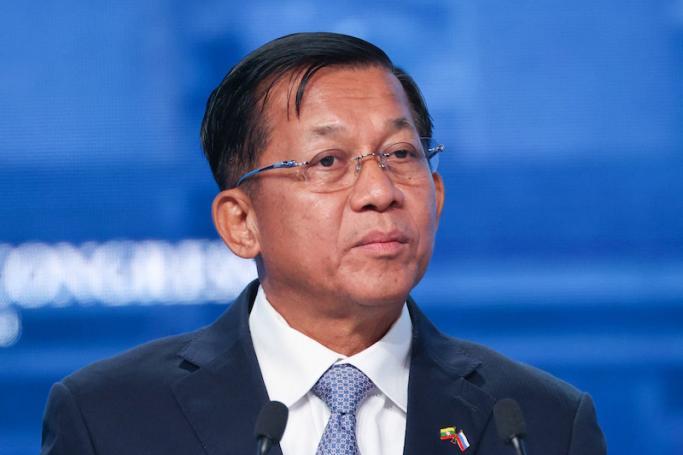Tin Htar Swe (for Mizzima)
Two years after staging a coup d’etat, the leader of the military junta, Senior General Min Aung Hlaing appears to be increasingly desperate to justify the military’s seizure of power through the ballot box.
Min Aung Hlaing seized power in February 2021 from the elected government led by Aung San Suu Kyi arresting her and almost her entire cabinet before declaring a state of emergency.
A provisional administrative body named The State Administrative Council (SAC) was formed by Min Aung Hlaing in the aftermath of the coup. The council, which comprises 9 military officers and 10 civilians was later reintroduced as a caretaker government and Min Aung Hlaing appointed himself as prime minister. He also announced an extension of the country’s state of emergency by an additional two years until elections are held.
Under the 2008 Constitution the National Defence and Security Council (NDSC) has the power to impose the state of emergency for not more than 2 years. The two-year period prescribed by Min Aung Hlaing is ending on the 31st of January.
The military-planned election is due to take place on 1 August this year even though less than 50 percent of the country is under military control. (The military has lost control of the rest of the country due to resistance forces and ethnic armies fighting to end the military dictatorship).
As the two-year emergency rule is ending the military is planning to replace the SAC with a ‘’transition council’’ headed by General Min Aung Hlaing while marking the second anniversary of the coup, according to the Irrawaddy News.
On 26 January, the junta -controlled media, Myanmar Alin newspaper published a new electoral law relating to the registration of political parties. The new law gives parties two months to re-register with the Union Election Commission. Failing to do so will automatically invalidate the party and it will be considered dissolved. The commission has also set minimum funding and membership levels for parties participating in the polls.
It bans participation by parties or candidates deemed to be unlawful or who have links to organisations designated as terrorist groups by the military government.
The new law has effectively made it very difficult for political parties other than the army-backed Union Solidarity and Development Party (USDP) to compete nationwide.
Many have questioned the legitimacy of the election and the National League for Democracy (NLD) has announced that it will neither accept nor recognise the sham elections.
The new law is widely seen as an attempt to disqualify the NLD party leaders should they chose to participate in the elections.
Although the SAC introduced these strict new electoral laws on its own terms to manipulate the electoral process, General Min Aung Hlaing doesn’t appear to feel confident that he will win the election.
A new order has been issued to the military-controlled media to broadcast a sermon by pro-military monk Venerable Sitagu three times a day which is about the eight qualities that the Lord Buddha used to conquer opponents.
Ministries and the army have also been ordered to recite the sermon and incantations regularly to ward off evil.
Undoubtedly winning the election is crucial for Min Aung Hlaing to legitimise his rule but it will be a major challenge to persuade voters to come to the polling stations.
Resistance forces and the powerful ethnic armed groups have made it clear that the electoral exercise will not be tolerated. Anyone who votes could become a target for resistance forces.
Over the last two years, the public has witnessed the brutality of the army, how it has killed and razed the homes of its own people. The traumas and the grievances of the people are still raw and the army is reviled.
The only way for Min Aung Hlaing to win the election is by stage-managing the vote as the army has done in the previous elections.
Losing is not an option for Min Aung Hlaing but seeking divine intervention is not the solution to the turmoil he and his associates have caused. Clearly, he is desperate to avoid defeat at any cost. The country should brace for more violence ahead.
Tin Htar Swe
(The author is former head of the BBC Burmese Service and is a Myanmar Analyst)












